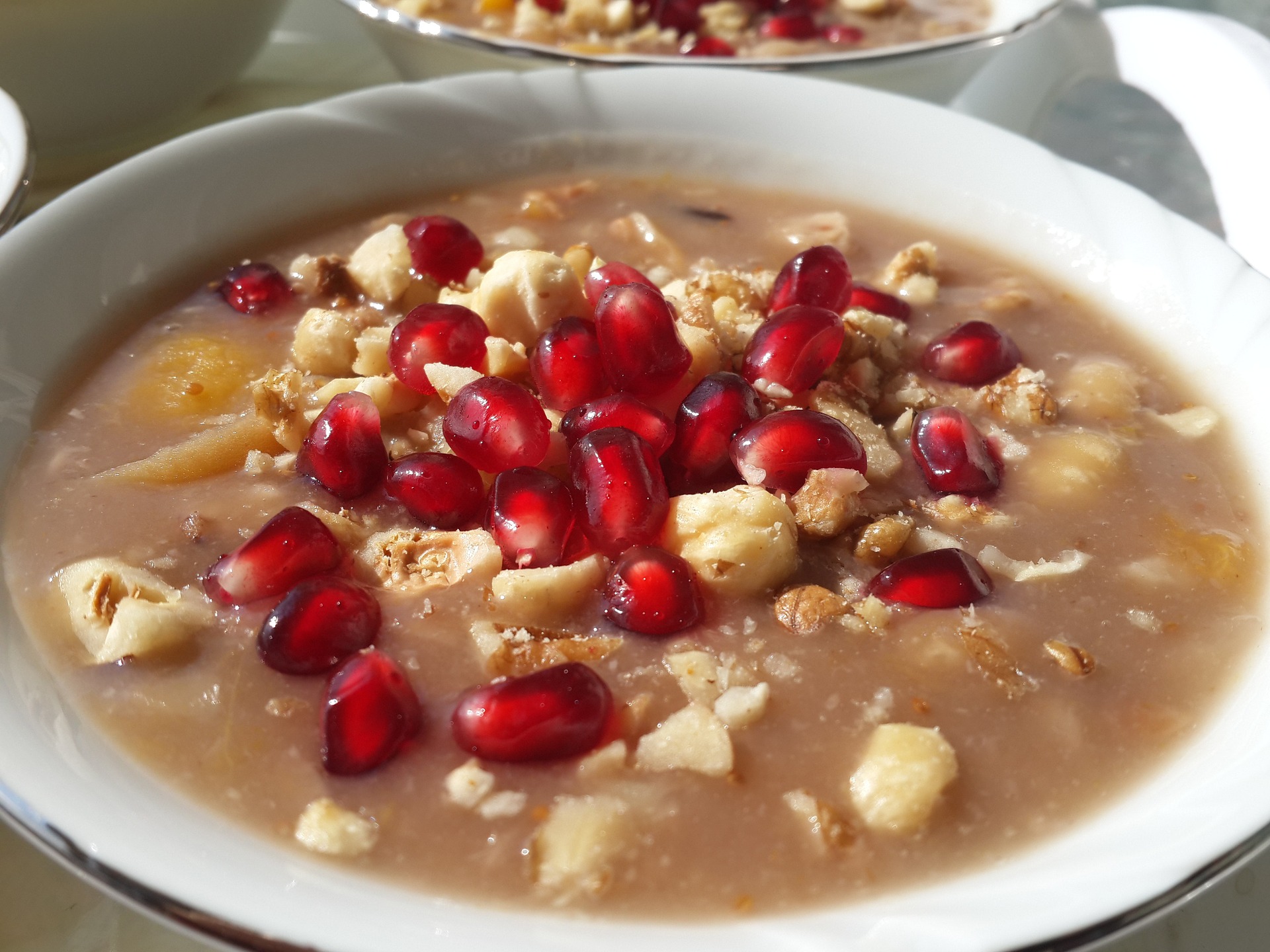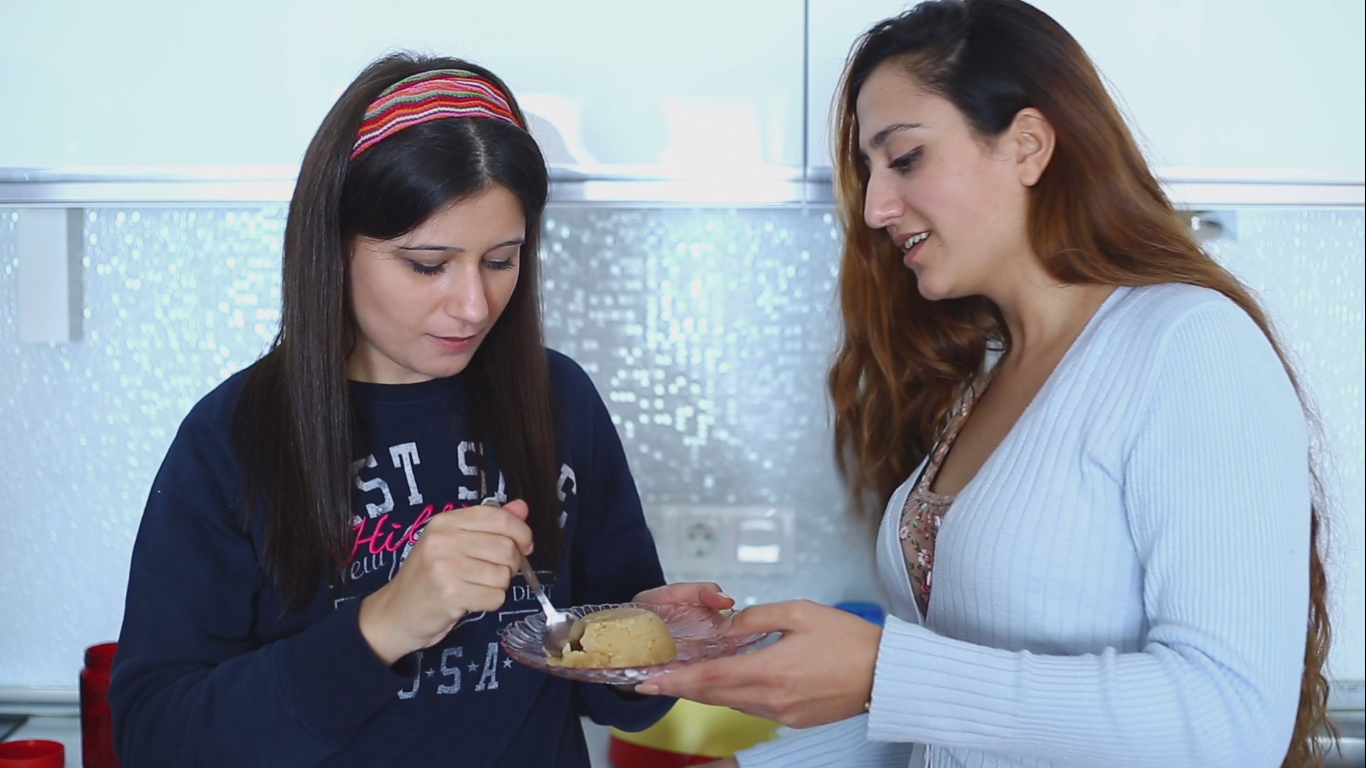In the video titled “Halva Recipe” in the 4th chapter, we tried to explain the ashura (aşure) tradition and neighbor relations in Turkey while emphasizing the grammatical structures used in recipes.
What is “Ashura”?

In Turkish “aşure” (aşura – ashura) is the name of a dessert made by simmering various grains, dried fruits and nuts with sugar. Dating back to hundreds of years in a number of cultures, the name of the dessert comes from the Arabic word “aşr”. In Arabic, “aşr” means “ten”, and “aşūrā” means tenth.1
As a significant element in Islamic culture, the day this dessert is made is called “Ashura Day” (Aşure Günü) because this day is the tenth day of the first month of the Islamic calendar (lunar calendar), the Muharram month.
According to the legend, the prophet Noah, after surviving the biblical flood, makes a soup with the last ingredients he has after making land. Since the day they survive was the tenth day of Muharram, the soup he made was called “aşure” (aşura).
Literature as well as some religious books lists the events assumed to have happened on that day as follows:
- Acceptance of Adam’s repent
- Survival of Noah’s ark from the biblical flood
- Escape of Moses and Israelites from Pharaoh’s persecution
Historical records indicate that because of the belief that many prophets’ survival and success happened on that day, Ashura day is regarded as sacred and celebrated by Arabic Persian and Israel nations. 2
Ashura Tradition in Turkish People
An important and sacred element of Turkish culture, making Ashura starts on the tenth day of Muharram according to the Islamic calendar, and covers a period of one month. This is why there is a one month period in Turkey called “Aşure Ayı”, and since its dates are determined based on the Islamic calendar, it’s always celebrated earlier than the previous year.
A symbol of plenty and bounty, the Ashura month is also the month of helping and sharing for Turkish people. Because the Ashura day is on the 10th day of Muharram, in time, some beliefs and behaviors have been adopted about the number “ten”.
These are:
- The Ashura made should be distributed to ten houses,
- Ten people should be greeted,
- Ten orphaned children should be cheered up,
- Ten poor people should be relieved,
- Ten relatives should be visited,
- Shopping should be done. (It’s believed that ten kinds of food purchased during the shopping will bring plenty to the home.)3
Even though not all of these apply today, distributing the Ashura on the day it’s made is a tradition that’s still kept. This is why Ashura is made in large pots, then poured into bowls, garnished with pomegranate and dried nuts, and distributed to the neighbors and relatives.
“Komşuda pişer bize de düşer.”

In Turkish culture, the relations with neighbors have a special significance. Turkish people treat their neighbors and these relations with care. In fact, there are a number of idioms and proverbs in Turkish about neighborhood. Phrases like “Ev alma, komşu al (Get right neighbors rather than the right house)”, “Komşu komşunun külüne muhtaçtır (Even in the smallest matters one neighbor can help another)”, “Komşuda pişer bize de düşer (Maybe we’ll benefit from our neighbor’s good fortune)” signifies how important neighbors are for Turkish people’s lives.
As can be appreciated from these phrases, neighbors for Turkish people mean someone to chat and socialize as well as to give or receive help when needed. In the metropolises of modern times, people living in huge complexes and apartments may have limited relations with their neighbors and what we talked about may not apply for them, but in general, the people who know and socialize with their neighbors uphold these traditions.
One of the traditions that has survived the time in neighbor relations is sharing food. Sending food that’s cooked and especially has an overwhelming smell to the neighbors is a pretty common and normal practice.
Among these, the two desserts, “aşure” and “helva” are the most traditional desserts distributed to the neighbors.
Similar to Ashura, helva (halva) is among the most important desserts in Middle Eastern culture popular in a wide geography.
Helva, made with flour, butter, sugar and milk (or water) is a dessert in Turkish Islamic culture that is made after someone’s funeral or their death anniversary. The person taking the helva prays for the dead. Both aşure and helva can be prepared anytime, but since it’s mostly made and prepared on special occasions mentioned above, it’s more appropriate to thank by saying “Allah kabul etsin” (May Allah accept it).
Tabak boş gitmez! (A plate is never returned empty!)
Since sending food to the neighbors in Turkish culture is common practice, thanking and accepting it is the expected behavior, however, taking the food and returning or later sending back the empty plate is regarded as distasteful. As you can see in the video, the expected behavior is to return the plate with something special you cooked.
If your Turkish neighbor sends you something, the most appropriate behavior is to accept it by saying “Elinize sağlık!” (God bless your hands).
Ayşin Önder
All rights reserved.
This text or any portion thereof may not be copied without prior written consent.
References
1 https://www.etimolojiturkce.com/kelime/a%C5%9Fure
2 http://dergipark.gov.tr/download/article-file/221493
3 http://www.acarindex.com/dosyalar/makale/acarindex-1423880826.pdf
http://dergiler.ankara.edu.tr/dergiler/37/728/9238.pdf



Leave A Comment